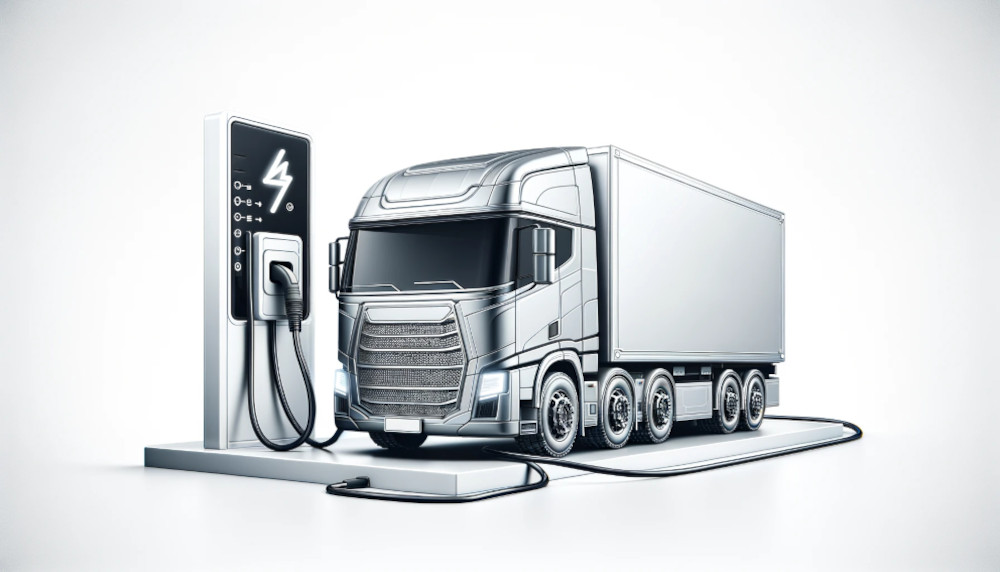The shift to E-trucks, marks an exciting turn in our journey towards a sustainable future.
These innovative vehicles are more than just a technological leap; they're a friendly nod to our planet. With their ability to cut down emissions and trim operating costs, E-trucks are quickly becoming a favorite in the world of transport.
They're not just about moving goods; they're about moving us forward to a cleaner, greener, and more efficient tomorrow. Let's take a closer look at how these electric giants are quietly powering a revolution on our roads.
What is an E-Truck?
An E-Truck, or electric truck, is a type of vehicle specifically designed for the transportation sector, utilizing electric power for propulsion.
These trucks are fundamentally different from traditional diesel-powered trucks, as they rely entirely on batteries to operate. This means that instead of an internal combustion engine, E-Trucks are equipped with one or more electric motors that draw energy from large battery packs installed within the vehicle.
The design of E-Trucks often mirrors that of conventional trucks in terms of size and load capacity, but without the typical engine, exhaust, and fuel systems.
This allows for a unique layout that can optimize space and efficiency. The exterior design might resemble traditional trucks, but the absence of a conventional engine often results in a quieter operation.
E-Trucks are part of a broader category of electric vehicles (EVs), but they are specifically tailored for EV fleet, commercial transportation, cargo delivery, and other industrial applications.
As the focus on sustainable and eco-friendly practices grows, E-Trucks are becoming an increasingly common sight in logistics, freight, and transport industries, offering a new approach to handling the demands of cargo transportation.

The Positive Impact of Electric Trucks
Electric trucks are revolutionizing the transport industry with their numerous benefits. These vehicles are not just an alternative to traditional diesel trucks; they represent a forward-thinking approach to logistics and transportation.
Here's a closer look at the positive impacts of electric trucks:
-
Reduced Carbon Footprint: Electric trucks significantly lower CO2 emissions, contributing to a cleaner environment.
-
Enhanced Performance: They offer a smoother driving experience with better torque and acceleration compared to diesel trucks.
-
Operational Efficiency: In urban areas, especially with frequent stops, electric trucks are more efficient than their diesel counterparts.
-
Employee Satisfaction: Companies report higher employee morale due to the environmentally friendly nature of electric trucks and their advanced technology.
-
Quieter Operations: The low noise levels of electric trucks allow for less disturbance and the ability to operate in noise-sensitive areas and at night.
-
Economic Advantages: Charging an electric truck is generally cheaper than refueling a diesel truck, leading to long-term savings.
-
Reduced Maintenance Needs: With fewer mechanical parts, electric trucks often require less maintenance, though this can vary with the model and usage.
-
Flexible Operating Hours: The quiet nature of these trucks enables businesses to operate outside typical hours, enhancing efficiency and service delivery.
-
Emergency Energy Source: In emergencies, electric trucks can potentially serve as mobile energy storage units, providing power where it's most needed.
-
Government Incentives: Many regions offer financial incentives for businesses that adopt electric vehicles, such as tax reductions and lower registration fees.
Optimizing Your E-Truck Fleet with AutoPi
Make the most of your electric truck fleet with AutoPi's innovative technology. AutoPi products, that are designed for EV telematics, steps in to streamline your operations, offering real-time insights into each vehicle's performance and health. With this user-centric system, you can easily monitor energy usage, track maintenance needs, and optimize routes for efficiency.
The data provided by AutoPi devices not only enhances your fleet's performance but also ensures that you're utilizing your E-Trucks to their fullest potential. Embrace the power of AutoPi to elevate your electric truck operations, focusing on efficiency, sustainability, and smart management.



